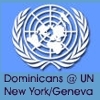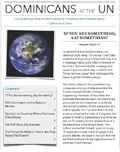

| BRIEFING - March 5, 2014 | To learn more about the Millenium Development Goals, click on the graphic Read the latest “Dominicans at the UN” newsletter Past Briefings: Feb 19, 2014 Jan 8, 2014 Nov 22, 2013 Oct 23, 2013 Oct 9, 2013 Sept 25, 2013 Sept 11, 2013 July 10, 2013 June 26, 2013 June 12, 2013 May 8, 2013 April 24, 2013 |
|
Social protection floors reduce inequality, create security I would like to begin this briefing by repeating once again what I wrote at the conclusion of the previous one:
There is no time like the present to re-commit ourselves to this worthy pursuit, acknowledging our own need for ongoing conversion as we do so. A recent statement from the Pontifical Council for Justice and Peace might provide us with one of the best ways to engage in this struggle as individuals and as communities:
As communities of believers, are we asking the right questions? Are we contributing to the public debate? Do our local and national representatives know who we are and what we stand for? Are we concerned about the welfare of people worldwide who live without the basic necessities for life? Or, does our silence and inaction contribute to the status quo? Over the past several years, significant momentum has built around the concept of Social Protection Floors. Though I have addressed this in previous briefings, it bears repeating as well as a renewed request for you to be proactive in this regard. Despite advances in technology, the world remains an inhospitable place for the vast majority of its citizens. Approximately 80 percent of the global population lives in social insecurity and faces a complete loss of income security when a personal or national economic crisis strikes. This is exactly what happened in the wake of the global financial/economic crisis of 2008–2009, as the poverty rate soared. Regarding health care, about 30 percent of the global population has no access to adequate care, and millions of children die annually from preventable diseases. Inequality is increasing in what to us may seem like a world of plenty. In an effort to be a positive force for good, a coalition of more than 70 civil society and trade union organizations have organized to promote social protection floors as a key instrument to provide a minimum of social security to every man, woman and child worldwide. These floors would be universal in scope and nationally defined and would represent significant commitment to the global goal to eradicate poverty. Social protection floors are essentially a way to make concrete what we subscribe to in the Universal Declaration of Human Rights:
The four basic guarantees of social protection are:
Well-designed social protection floors can reduce inequalities and enhance gender equality. Access to health care, nutrition, water and sanitation maintains people in good health and leads to more sustained employment. Access to housing fosters stability and civic participation. Could there be any legitimate reason for a government not to make these provisions for its people? Is there any better way to create the conditions for peace and security for us all? Will the newly released fiscal 2015 Pentagon budget of $495.6 billion really make the world a safer place? Today, Wednesday, March 5, we begin the season of Lent. We hear in the second reading from 2 Corinthians that “now is the acceptable time…” “Action on behalf of justice and participation in the transformation of the world fully appear to us as a constitutive dimension of preaching the Gospel.” There is no time like the present to recommit ourselves to this worthy pursuit. As you begin this Holy Season, please take a minute to place yourself in solidarity with those who lack life’s basic essentials, and sign the Social Protection Petition: http://tiny.cc/dpfz7w. You can also view a seven-minute YouTube video on Social Protection Floors, and how they are already working in countries such as Argentina, Namibia, India and Thailand: http://tinyurl.com/nyx3o4t.
|
Dominican Leadership Conference
Building relationships and collaborating in the mission of preaching the Gospel
29000 West Eleven Mile Road
Farmington Hills MI 48336
248-536-3234 Contact: Executive Director

